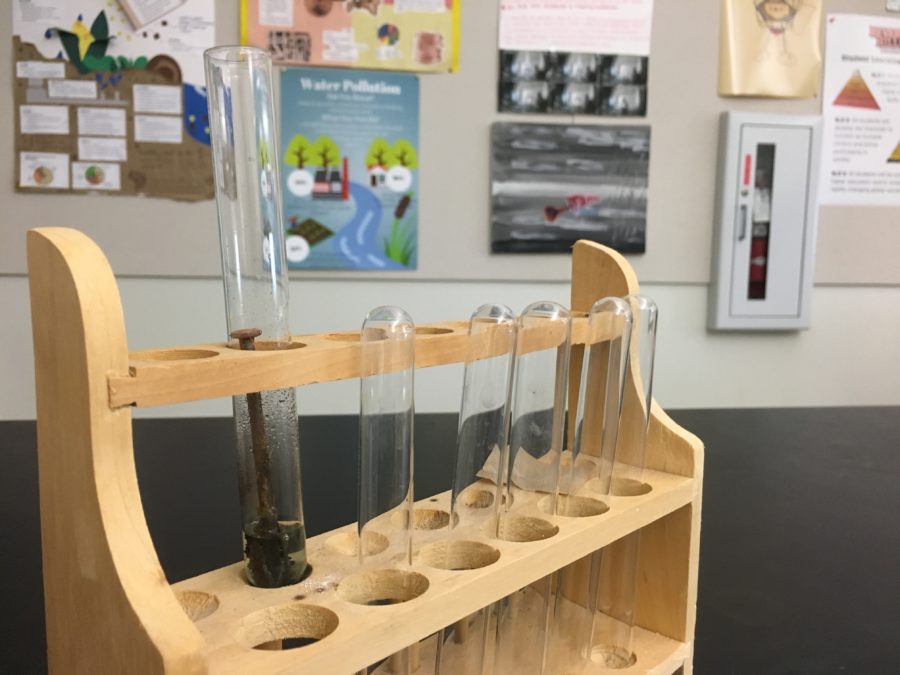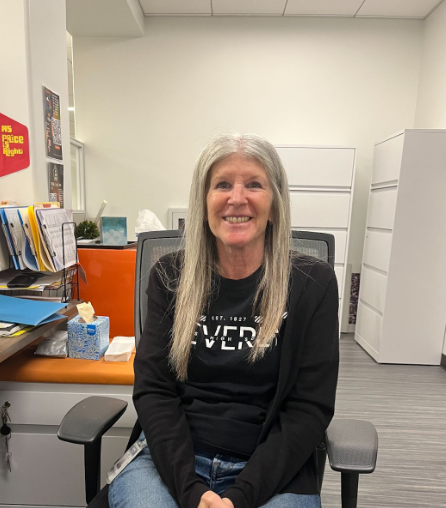Ava Seccuro staff writer
In Science Olympiad, club members have the opportunity to compete in events and experiment with any medium of science beyond their wildest dreams; however, outside of the exploratory process of competition preparation, the club has come to discover that they are facing problems regarding attendance and exposure.
Members can choose from a myriad of events, ranging from written tests to building and forensics. Each person can choose three to four events to compete in, and the goal is to have the least amount of points with all of your teammates combined. The top six teams with the fewest amount of points move on to state competitions. The club’s first competition was on Feb. 23, which they place 16th out of 50 schools in the Los Angeles region. Members are meeting on Wednesdays and Fridays after school to study for their events for next year.
Treasurer junior Michelle Klein participated in Science Olympiad in elementary school, but when she got to high school, she had some difficulty finding information about the club.
“I actually did [Science Olympiad] in elementary school and it was so much fun. I loved it. Then I got to high school, and my sophomore year, I asked a bunch of people [about the club] and I finally found the team,” Klein said. “I had done it before, it was a really good experience for me, so I wanted to try it again at a higher level.”
As much as members are excited and passionate about upcoming events, in retrospect, the club’s attendance, according to co-president senior Jiho Park, is increasingly lower due to limited exposure and stringent team limits.
“[Attendance] is mostly low because of the time commitment required. From my experience, it’s not as much commitment as robotics or Acadeca, but it’s still a lot more than people are willing to put in,” Park said. “It’s also because there’s not a lot of exposure to Science Olympiad because [we] place team limits. Usually what happens is if you have 15 members that you feel are committed, you usually don’t recruit anymore. But, we’ve been finding that we should recruit more than we need because people get sick, people can’t show up and people drop.”
As the majority of the club is comprised of seniors, Klein believes that the club will have to ramp up the recruiting process by asking science teachers who teach underclassmen to promote the club.
“Especially next year when all the seniors graduate, we’re really going to have to double down on recruiting and try to get as many people as we can,” Klein said. “We’re talking about getting a lot of the science teachers, especially the ones who teach freshmen, so they can be in it for a few years. Mainly from asking the teachers to tell their kids and get people who like science.”
Another way to enhance the prestige of the club, according to Park, is to keep members sharp by preparing them for future events.
“I’ve noticed last year that after we were done with competition, we didn’t really do anything. I’m hoping this year we can train the members that are staying behind in events that they might want to do next year, so we’re better prepared,” Park said.
Newcomer junior Charlie Levy, who has been a part of Science Olympiad for around two weeks, notes a striking difference between when he first joined and now.
“All these kids are super smart. They all know what they’re supposed to be doing, but I felt like it was a little bit unorganized because a lot of the kids don’t take it seriously and they just want to put it on their college applications,” Levy said. “Now, Ms. Smith and [the presidents] have had them ramping it all up. We meet twice a week now, we work really hard and a lot of kids are a lot more dedicated than when I first joined.”
Aside from some of the concerns Science Olympiad is confronted with, Park, among others, attests to what the club has done to enrich her high school experience.
“It’s really just the experiences you get to have; it’s nothing like what you have in school because you have all these hands-on events. For me, one of the best parts about the club is the event ‘forensics,’” Park said. “I get to work with Bunsen burners and all this equipment that I never get to work within school. It’s really like a self-guided thing…so it’s more of an exploratory process.”
Along with Park, Klein reminisces on her past experiences at Science Olympiad and agrees that the best part of the club is the experiences one has the opportunity to have, but she also enjoys the bonds that she gets to form with her teammates more than anything else.
“My favorite part is the actual event. There are so many people from all over the state, and it’s just fun to bond with the team and talk to them,” Klein said. “At the end, there’s a medal ceremony, and last year I medalled in one of my events and it was a great feeling to know that all of my hard work actually pays off.”
Categories:
Science Olympiad seeks to recruit more members for next year’s competition season
February 25, 2019
0
Donate to Highlights
$125
$1000
Contributed
Our Goal
Your donation will support the student journalists of Beverly Hills High School. Your contribution will allow us to purchase equipment and cover our annual website hosting costs.
More to Discover





























